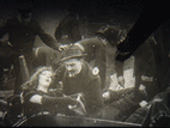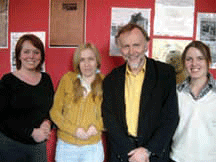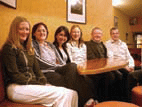|
EARLY CINEMA
7th British
Silent Cinema Festival
Broadway Media Centre Nottingham - 15-18 April 2004

Early war hysteria: Will Barker's The German Spy Peril
discussed by Jude Cowan at Nottingham
The
inspiration for a postgraduate training scheme piloted at this year’s
Nottingham British Silent Cinema Festival was a feature of the Giornate
del Cinema Muto, or Pordenone Silent Film Festival as it is informally
known, the leading international event of its kind. For some years,
since the Italian festival was forced to relocate to the nearby
town of Sacile in the Veneto, its director David Robinson has run
the Collegium Saciliensis, in which a group of young scholars and
researchers are welcomed as guests of the festival, and treated
to a daily lunchtime seminar from some of the visiting early cinema
specialists. So popular have these sessions become, that the margins
of the semionar room are packed with festival visitors hoping to
join in.
Nottingham’s
annual silent festival is the only one devoted to exploring Britain’s
still-unknown silent legacy, and is a collaboration between Laraine
Porter, director of Broadway Media Centre, and Bryony Dixon of BFI
Collections (and a former centre exchange fellow). Increasinlgy
it has become an important date in the international silent cinema
calendar, now attracting visitors from far afield. This year, with
due acknowledgement to Pordenone/Sacile, the first Nottingham ‘collegium’
took place. Four research students received bursaries through the
Centre’s postgraduate training fund to attend this year’s event,
built around the theme of the Great War on screen, and held discussions
with specialists over lunch each day. Among the tutors were Frank
Gray, Luke McKernan, David Robinson – professing his delight at
the new initiative – and Ian Christie. From modest beginnings, a
continuing programme in envisaged.

Postgraduate
students (L to R) Jane Bryan (UEA), Jude Cowan (Birkbeck) and
Clare Watson (UEA), with Ian Christie, at the 2004 British Silent
Cinema Weekend
|
|
RESEARCHING
REGIONAL AND NATIONAL FILM AND TELEVISION
University
of Ulster, Coleraine (Portrush site) - 29 April 2004
The
University of Ulster’s main project within the Centre concerns regionalism,
in both film and television (a report from its work on Ulster television
appears on p.4), and this provided the theme for a research day
on 29 April aimed primarily at postgraduates. Held at the university’s
Portrush campus, on the spectacular Atlantic coast of Northern Ireland,
the day was divided into three parts.
Morning and early afternoon sessions were addressed by a combination
of senior and junior researchers, providing case-study examples
of work in progress, and drawing out methodological and scoping
implications of these cases. In addition to John Hill, Martin McLoone
and Centre research fellow Andrew Hill from University of Ulster,
discussing their work on Irish material, Valentina Vitali spoke
about regionalism in Indian cinema and Ian Christie about ‘micro-history’,
taking the reception of Robert Paul’s Anglo-Boer War films in North
London as his example.
Then
followed two parallel sessions in which invited postgraduates from
Trinity College Dublin, Limerick, Bristol, Nottingham, Nottingham
Trent, Leicester and Antwerp, gave short presentations on their
doctoral projects, ranging from studies of Nottingham’s film societies
and ‘fantasy Ireland’ to issues of national/linguistic identity
in Belgian television, and in Balkan and contemporary Russian cinema.
Discussion was lively, with the audiences more than ready to contribute
comments on scope and method, and to offer suggestions for new frontiers
to be explored.
The
third part of an already busy day consisted of a keynote lecture
by the Australian-born scholar and writer Meaghan Morris, currently
teaching at Lingnan University, Hong Kong, ‘On the future of Parochialism:
Globalisation, Culture and Cinema Studies in Tuen Mun’. This offered
a typically wide-ranging and engaging survey of the shifting parameters
of ‘local’ and ‘global’ from the Pacific vantage point that Morris
occupies.
Undaunted, the postgraduates continued their exploration of cultural
difference over a well-earned drink later in the evening (below).
On
the following day, the all-Ireland Postgraduate Film research Seminar
took place, providing two days of intensive interchange on research
addressing the intersection of the national and the regional – another
example of the Centre aiming to provide high-quality research training.

Postgraduates
at Portrush after the University of Ulster's research day.
|